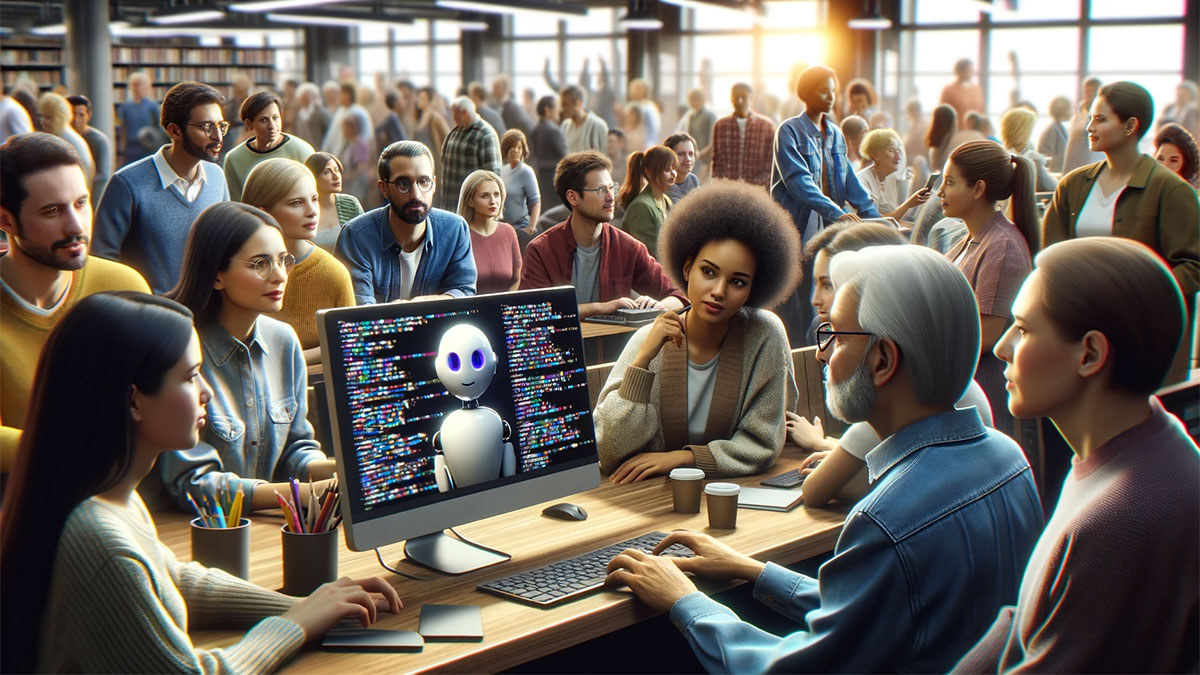In the rapidly evolving landscape of artificial intelligence (AI), ChatGPT, a generative AI chatbot developed by OpenAI, has emerged as a significant player. Its sophisticated natural language processing capabilities have made it a topic of interest not only among technologists but also in the broader public discourse.
This article looks into the interaction between the average American and ChatGPT, drawing upon recent studies and surveys to paint a comprehensive picture of this relationship.
Article Highlights:
- Around 58% of U.S. adults are familiar with ChatGPT, but only 14% have used it, with its usage increasing productivity in certain tasks by 40%.
- Roughly one in five U.S. teenagers have used ChatGPT for schoolwork, with higher usage seen in older grades.
- Among adults who have used ChatGPT, 40% report it as being somewhat useful, demonstrating its growing impact in various applications.
ChatGPT: A Brief Overview
Understanding ChatGPT
ChatGPT is a part of the GPT (Generative Pre-trained Transformer) series, representing a leap in AI’s ability to generate human-like text. It’s designed to understand and generate language in a way that’s often indistinguishable from a human.
This capability has opened up various applications, from writing assistance to customer service bots, and has sparked discussions about the implications of such technology in everyday life.
Evolution and Capabilities
The evolution from earlier models like GPT-2 to GPT-3 and ChatGPT-3.5 showcases significant improvements in coherence, context handling, and general language understanding.
ChatGPT can write essays, mimic styles, answer questions, and even create content on a vast array of topics, making it both a versatile tool and a subject of scrutiny.
American Public’s Encounter with ChatGPT
Awareness and Exposure
Recent surveys, notably by the Pew Research Center, reveal intriguing insights into how ChatGPT is perceived and used by the average American. About 58% of U.S. adults are familiar with ChatGPT, indicating a considerable level of public awareness. However, only 14% have actively used it, suggesting a gap between awareness and hands-on experience with the technology.
Demographics of Usage
The use and awareness of ChatGPT vary across different demographic groups. Adults with higher education levels and those from wealthier households are more likely to be familiar with ChatGPT.
There’s also a noticeable difference in usage patterns based on age, with younger adults more likely to find ChatGPT useful compared to their older counterparts.
ChatGPT in Everyday Life: Usage and Utility
Practical Applications
Among those who have used ChatGPT, the applications range from entertainment to learning new things and assisting in work-related tasks. The technology has shown its potential to enhance productivity, as evidenced by a study from MIT, which found that tasks like writing cover letters and emails were completed 40% faster with ChatGPT, and the output quality improved by 18%.
Impact on Productivity and Work
The MIT study also highlighted the potential of ChatGPT in reducing performance inequality among workers. Those who initially performed lower in tasks saw more significant benefits from using ChatGPT, pointing towards its role in leveling the playing field in professional settings.
Limitations and Concerns
Despite its utility, ChatGPT’s limitations, such as occasional factual inaccuracies and the invention of information, have raised concerns. These limitations are particularly relevant in contexts requiring high accuracy, like academic research or news reporting, where the credibility of information is paramount.
ChatGPT in Education: A Tool for Learning?
Growing Use Among Teens
ChatGPT’s role in the educational sphere, especially among teenagers, has been a subject of considerable debate. Pew Research Center reports that about 13% of U.S. teens have used ChatGPT for schoolwork, with higher usage among older students in 11th and 12th grades. This trend reflects the growing interest of younger generations in leveraging AI for educational purposes.
Perceptions of Appropriateness
While there is notable support among teens for using ChatGPT to explore new topics, its use in writing essays or solving math problems is more contentious. The majority view using AI to write essays as unacceptable, raising questions about academic integrity and the role of AI in learning.
ChatGPT’s Role in Schools
The introduction of ChatGPT into the educational context has sparked discussions about whether to integrate this technology into classrooms or restrict its use. This debate underscores the need for a balanced approach to incorporating AI tools in education, one that enhances learning without undermining the development of critical thinking and problem-solving skills.
Ethical Considerations and Social Implications
AI-Generated Content and Misinformation
One of the key concerns with ChatGPT is its potential to generate misinformation. Instances of the chatbot creating factually incorrect content or even fabricating information highlight the need for caution in relying on AI for information dissemination. This aspect is particularly crucial in contexts where the accuracy of information is critical, such as news reporting or academic research.
Impact on Employment and Skill Development
As AI tools like ChatGPT become more prevalent, there are concerns about their impact on employment and the development of skills. While AI can enhance productivity and efficiency, it also raises questions about the future of certain job roles and the skills that will be valued in an AI-integrated workplace.
Addressing Bias and Inclusivity
The demographic differences in the awareness and use of ChatGPT point to broader issues of digital divide and inclusivity. Ensuring that AI technologies like ChatGPT are accessible and beneficial to diverse groups is essential in preventing the widening of existing disparities.
ChatGPT in the Professional Sphere
Enhancing Productivity and Creative Endeavors
In professional settings, ChatGPT has shown promise in enhancing productivity and assisting with creative tasks. From drafting emails to generating ideas, the AI’s ability to handle language effectively can be a significant asset in various work environments.
AI as a Collaborative Tool
ChatGPT’s role is increasingly seen as that of a collaborator rather than a replacement for human effort. In fields such as marketing, consulting, and human resources, ChatGPT can aid in brainstorming, drafting initial content, and even providing insights, which can then be refined and contextualized by human professionals.

The Future of ChatGPT and Generative AI
Technological Advancements and Limitations
As AI technology continues to evolve, future versions of ChatGPT are expected to become more sophisticated, potentially addressing current limitations such as factual accuracy and the generation of biased content. Ongoing research and development in AI promise more advanced capabilities, including better context understanding and more nuanced language generation.
Balancing Potential and Caution
The trajectory of ChatGPT and similar AI technologies will likely involve a continual balancing act between harnessing their potential and exercising caution. This balance is necessary to ensure that while AI tools are used to their full potential, their limitations and the ethical implications of their use are not overlooked.
Integrating AI Responsibly
Looking ahead, the integration of AI tools like ChatGPT into various facets of life, from education to the workplace, will necessitate thoughtful approaches. This involves not only technological development but also policy-making, ethical guidelines, and public awareness to ensure that AI is used responsibly and inclusively.
—
Sources:
- “Majority of Americans have heard of ChatGPT, but few have tried it,” 2023, Pew Research Center: www.pewresearch.org
- “Use of ChatGPT for schoolwork among US teens,” 2023, Pew Research Center: www.pewresearch.org
- “Study finds ChatGPT boosts worker productivity for some writing tasks,” 2023, MIT News | Massachusetts Institute of Technology: news.mit.edu

